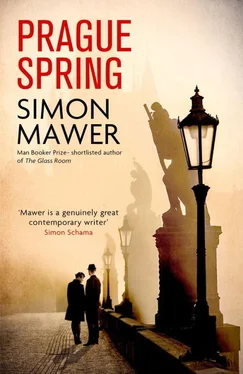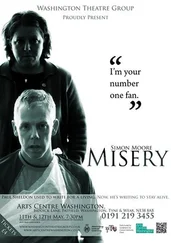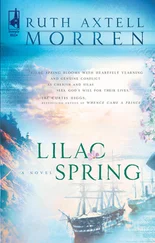‘What’s there to be guilty about?’
‘You wouldn’t understand. You don’t have to be guilty of anything in order to feel guilt. That’s the secret.’
‘That’s daft.’
‘Daft it may be but that’s how it is – original sin. The most oppressive thought control anyone has ever invented. George Orwell’s Thought Police, centuries before he ever wrote about it. The Catholic variation is that you are the police as well as the criminal.’
‘But if you no longer believe it, where’s the problem?’
She looked at him, head on one side. ‘You don’t understand, do you? That’s what I like about you. You see life in simple terms.’
‘It is simple. It’s you who’s screwed up. You shouldn’t spend so much time thinking about things. Just let them happen. Religion’s no different from studying literature – you spend all your time obsessing about fictitious people and imagining they’re real.’
‘You sound,’ she said, ‘just like my father.’
‘He sounds all right.’
And eventually, there they were, at her house in Surrey, in the stockbroker belt, with Leatherhead on the one hand and Esher on the other and Sheffield as far away as Patagonia. And he was about to meet both her mother and her father. Mummy and Daddy.
The father was a daunting man – big, loud, with a sharp look and a quick tongue. A lawyer, apparently. A barrister, a QC in fact, although James barely understood the difference between one type of lawyer and another except that barristers wore gowns and wigs, which always seemed bloody silly. Yet somehow he could see that Mr Pike would not look silly in gown and wig, would not ever look silly in fact, but would be well practised in the fine art of making others both look and feel immensely foolish. ‘So you’re the latest, are you?’ he boomed. A bittern, James thought. A bittern booming. The same posture, hunched over his utterance, grasping his lapels, glaring at the witness.
‘The latest?’
‘Eleanor’s latest.’
She stood close to her father, hugging his arm. ‘Daddy, I keep telling you, he’s just a friend .’
Daddy’s gaze never wavered. ‘Well she would say that, wouldn’t she?’ he boomed, and James laughed, recognising the line in the way that one might recognise a Latin tag, with amusement but also with the faint sense of having passed some kind of test.
‘Actually, what Ellie says is true, sir. We are just friends. Unless she knows something I don’t.’
Daddy liked the ‘sir’. It showed an appropriate measure of deference. He liked the recognition of his quotation, liked the humour of the response. ‘It is my experience,’ he said, in the portentous manner of the judge he would doubtless soon become, ‘that a woman almost always knows something that a man doesn’t.’
Dinner that evening was a ritual fraught with the possibility of solecism. Her mother was a pinched woman with heavily applied makeup and suspiciously brassy hair, whose eyes settled on James like two iridescent beetles, watching him carefully to see how he manoeuvred his knife and fork, how he used his napkin, how he broke his bread and which way he tilted his soup bowl. ‘That’s an interesting accent you have,’ she remarked when he dared speak. ‘Do you come from Manchester?’
‘Sheffield.’
Her mouth compressed, as though he might have got it wrong. ‘Eleanor said Manchester.’
‘I suggested Manchester, Mummy, ages ago.’
‘Sheffield is in Yorkshire, isn’t it?’
‘That’s right. And Manchester is in Lancashire, on the other side of the Pennines.’
‘The Pennines,’ the mother repeated, as though he might have said the Urals or the Carpathians. ‘And what do your people do, James? On their side of the Pennines.’
Your people . As if he came from one of the great families of the North, Percys or Nevilles, wild people leading bands of kerns and gallowglasses and for ever waging wars against their neighbours and the Picts over the border. ‘Both my parents are teachers.’
‘Oh, indeed, are they? Amble forth?’
James looked blank. Amble forth? Was that what she imagined Northerners did? Did she think they ambled forth into the Peak District or something, like the ramblers on Kinder Scout in the 1930s? He felt that he had been put to a further test and this time had failed. ‘I’m sorry, I…’
‘Friends of ours have children there. The Remnants.’
‘Remnants?’
‘An old recusant family. Obviously not.’
James looked even blanker. It was safe to say that he had not understood a word of that particular exchange. Remnants? Recusants? Ambling forth? The woman seemed to live in an alternative linguistic universe.
‘Mummy, James’s parents teach at a grammar school,’ Eleanor explained. ‘Not bloody Ampleforth.’
‘A grammar school? Where they teach—?’
‘Grammar,’ said James.
It was with some relief that he accepted the barrister’s invitation to join him in his study after dinner to try his favourite malt whisky. You couldn’t argue that the family stinted on alcohol. Before dinner it had been G&T; during the meal they had consumed three bottles of a red wine called Aloxe-Corton which had been quite good; and now it was a malt whisky that had lain in casks in a dank cave in Scotland since before James was born.
The barrister sat in his large, leather wing-back chair while James pressed himself defensively into the corner of a button-back Chesterfield. Once they had dispensed with the formalities of sipping and exclaiming and agreeing that this golden elixir ranked amongst the finest experiences a man could have, the barrister regarded James with beady and judgemental eye. ‘So are you two sleeping together?’ he asked.
‘I’m sorry?’
‘My daughter. Eleanor. Are you sleeping with her? It’s a plain enough question.’ How to describe the expression on his face? Bleak? Accusatory? Adversarial?
‘No sir. Of course not.’
‘What’s “of course” about it? Doesn’t every young man want to sleep with every young woman? According to the papers the younger generation does that kind of thing all the time, apparently to the exclusion of everything else except smoking pot. Surely all the journalists can’t be wrong.’
‘I can’t answer for my generation.’
‘But you can for Ellie and you.’
‘What I said before: we’re just good friends.’
‘Ha! You sound as though you’ve just been caught in her bedroom with your trousers round your ankles.’
‘But it’s true.’
‘And is that the limit of your ambition? Mere friendship?’
The barrister’s eyes, James decided, were considerably less blurred with alcohol than his speech. He was probing with intent, edging towards some kind of judgement about James’s suitability as company for his daughter or, more probably, manoeuvring into a position to warn him off. You’re not worthy, are you, young man? Something like that. You don’t have the right background, the right accent, the right parents and prospects.
‘Well, I’m very fond of her, of course. But there’s another man around, isn’t there? Kevin, I mean. He sort of gets in the way.’
The barrister smiled knowingly. ‘Ah, yes. Kevin.’
‘Ellie still seems a bit in love with him.’
‘Does she, indeed?’
‘And I think it better to let her get over that.’
The barrister sniffed. Perhaps at his whisky. ‘Do you want some advice? No, I don’t suppose you do. The young never want advice from their elders and betters, at least not until they’re on remand and trying to convince a judge that they are of good and upright character and should be granted bail. But I’ll give you some nevertheless.’ He sipped and savoured for a moment, contemplating the texture of his words. ‘Women are fantasists. That makes them good historical novelists and bad witnesses. Love them as much as you want, but don’t ever make the mistake of believing what they tell you. Especially anything that my daughter says.’
Читать дальше












